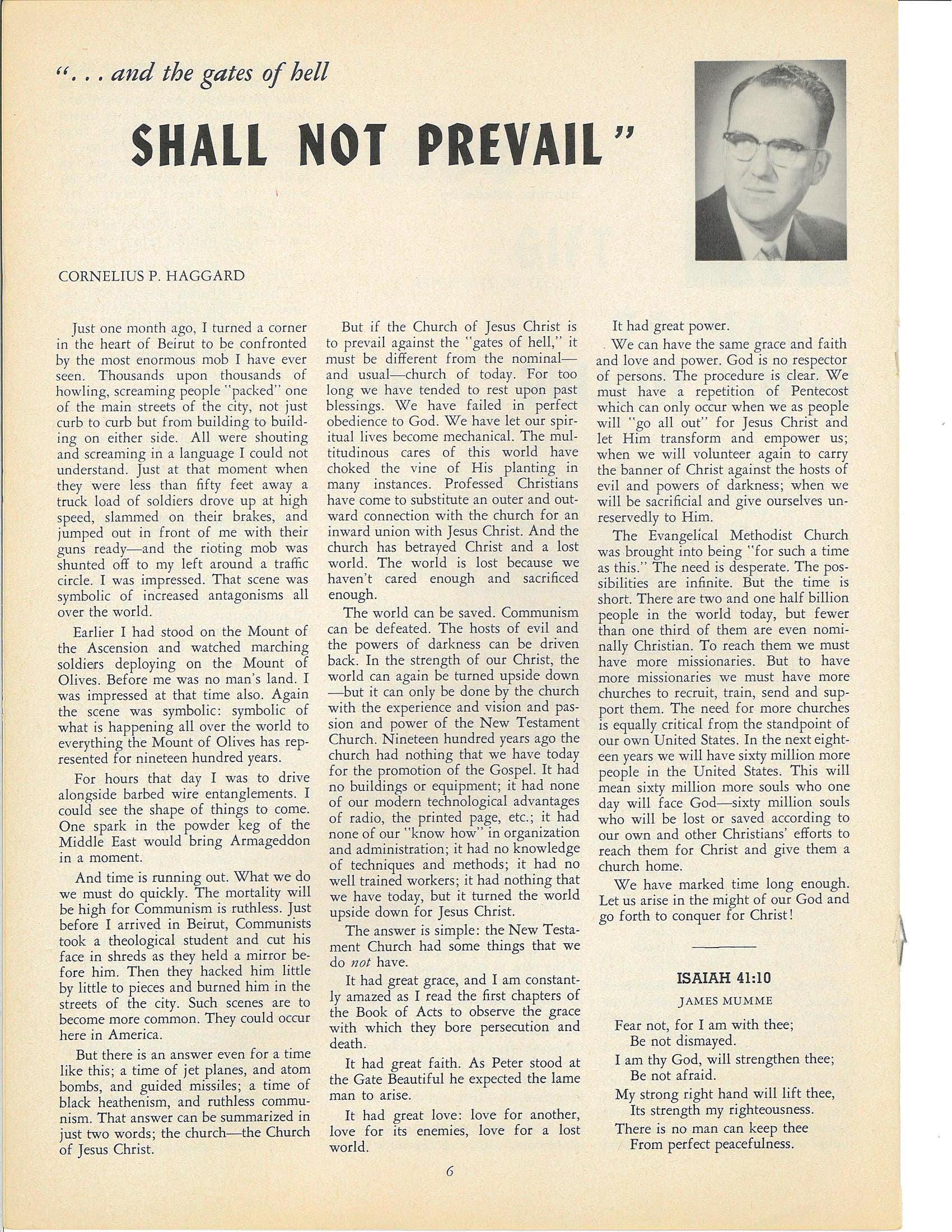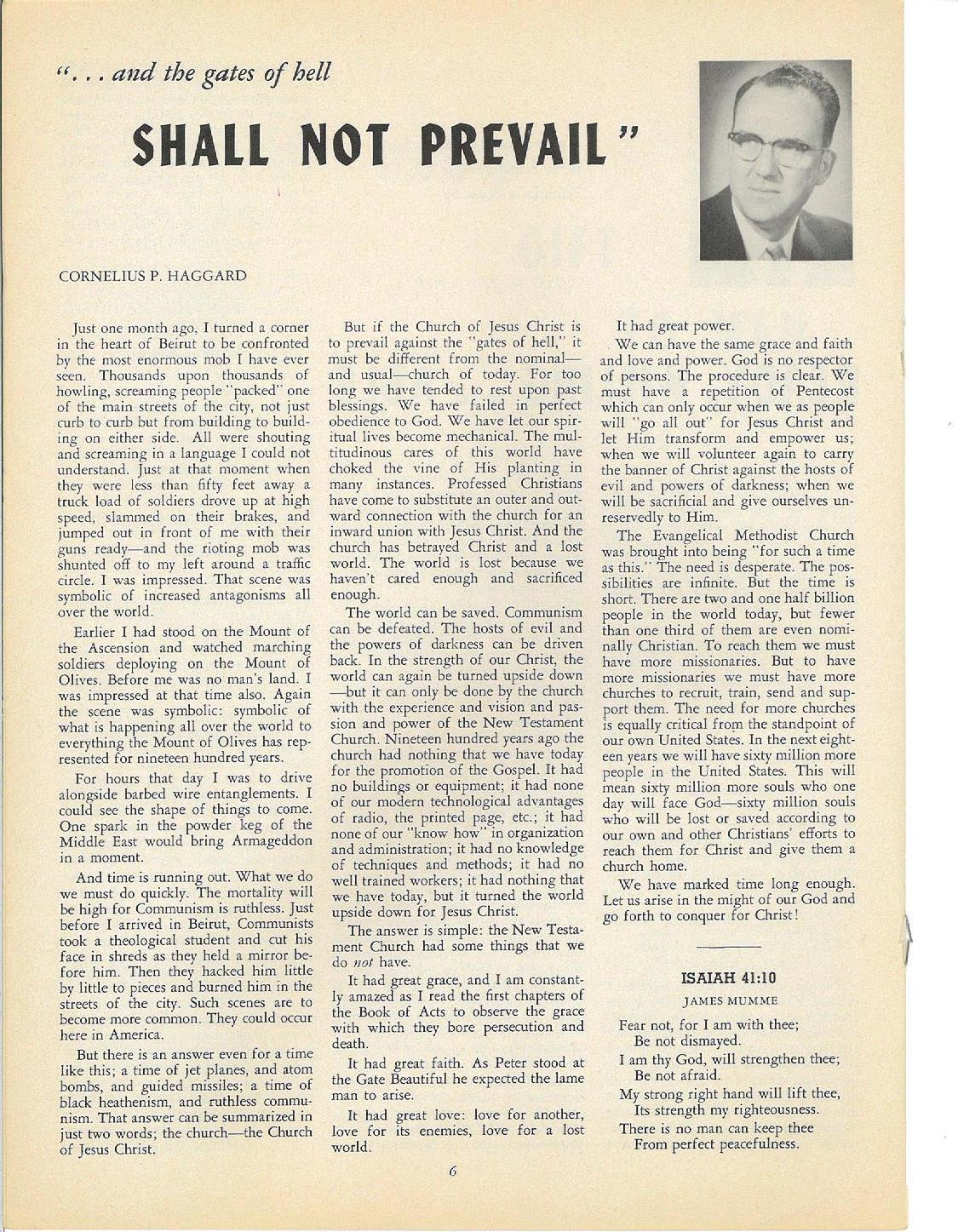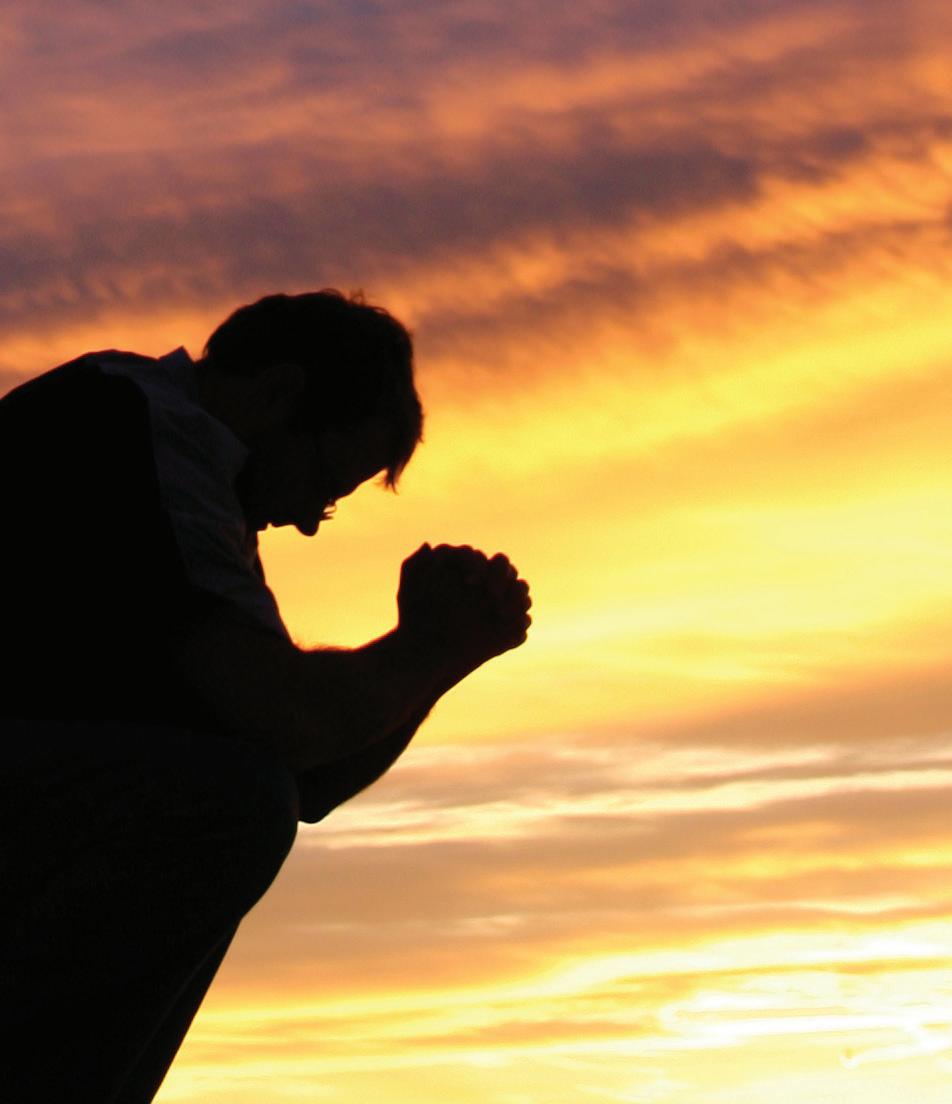
5 minute read
Shall Not Prevail
Dr. C. P. Haggard ~ 1959
Just one month ago, I turned a corner in the heart of Beirut to be confronted by the most enormous mob I have ever seen.
Advertisement
Thousands upon thousands of howling, screaming people “packed” one of the main streets of the city, not just curb-to-curb but from buildingto-building on either side. All were shouting and screaming in a language I could not understand. Just at that moment when they were less than fifty feet away, a truck-load of soldiers drove up at high speed, slammed on their brakes, and jumped out in front of me with their guns ready – and the rioting mob was shunted off to my left around a traffic circle. I was impressed.
That scene was symbolic of increased antagonisms all over the world.
Earlier, I had stood on the Mount of the Ascension and watched marching soldiers deploying on the Mount of Olives. Before me was noman’s-land. I was impressed at that time also. Again, the scene was symbolic: symbolic of what is happening all over the world to everything the Mount of Olives has represented for nineteen hundred years.
For hours that day, I was to drive alongside barbed-wire entanglements. I could see the shape of things to come. One spark in the powder keg of the Middle East would bring Armageddon in a moment.
And time is [short]. What we do, we must do quickly. [Truly, many lives hang in the balance]. Just before I arrived in Beirut, Communists took a theological student and cut his face in shreds as they held a mirror before him. Then they [dismembered] and burned him in the streets of the city. Such scenes are to become more common. They could occur here in America. [But] even for a time like this - - a time of jet planes, atom bombs, and guided-missiles … [THERE IS AN ANSWER]. That answer can be summarized in just two words; the church – the Church of Jesus Christ.
But if the Church of Jesus Christ is to prevail against the “gates of hell,” it must be different from the nominal - - and usual - - church of today. For too long we have tended to rest upon past blessings. We have failed in perfect obedience to God. We have let our spiritual lives become mechanical. The multitudinous cares of this world have choked the vine of His planting in many instances. Professing Christians have [exchanged] an inward union with Jesus Christ for a [hollow] connection with the church. And the church has betrayed Christ, and a lost world. The world is lost because we haven’t cared enough, and sacrificed enough.
The world can be saved. … The hosts of evil and the powers of darkness can be driven back. In the strength of our Christ, the world can again be turned upside down - - but it can only be done by the church with the experience, and vision, and passion, and power of the New Testament Church. Nineteen hundred years ago, the church had nothing that we have today for the promotion of the Gospel. It had no buildings or equipment; it had none of our modern technological advantages of radio, the printed page; etc.; it had none of our “know how” in organization and administration; it had no knowledge of techniques and methods; it had no well-trained workers; it had nothing that we have today, but it turned the world upside down for Jesus Christ.

Th e answer is simple: the New Testament Church had some things that we do not have.
It had great grace, and I am constantly amazed as I read the fi rst chapters of the Book of Acts to observe the grace with which they bore persecution and death.
It had great faith. As Peter stood at the Gate Beautiful, he expected the lame man to arise.
It had great love; love for another, love for its enemies, love for a lost world.
It had great power. We can have the same grace, and faith, and love, and power. God is no respecter of persons. Th e procedure is clear. We must have a repetition of Pentecost which can only occur when we as a people will “go all out” for Jesus Christ and let Him transform and empower us: when we will volunteer again to carry the banner of Christ against the hosts of evil and powers of darkness; when we will be sacrifi cial and give ourselves un-reservedly to Him.
Th e Evangelical Methodist Church was brought into being “for such a time as this.” Th e need is desperate. Th e possibilities are infi nite. But the time is short. Th ere are two-and-one-half billion people in the world today, but fewer than one third of them are even nominally Christian. To reach them, we must have more missionaries. But to have more missionaries we must have more churches to recruit, train, send, and support them. Th e need for more churches is equally critical from the standpoint of our own United States. In the next eighteen years, we will have sixty million more people in the United States. Th is will mean sixty million more souls who one day will face God - - sixty million souls who will be lost or saved according to our own and other Christians’ eff orts to reach them for Christ and give them a church home.
We have marked time long enough. Let us arise in the might of our God and go forth to conquer for Christ!
Dr. Cornelius Paul Haggard (1911-1975) served as President of the Training School for
Christian Workers in Azusa, CA, which came to be Azusa Pacifi c College. He served as Assistant General Superintendent under Dr. J. H. Hamblen.
















